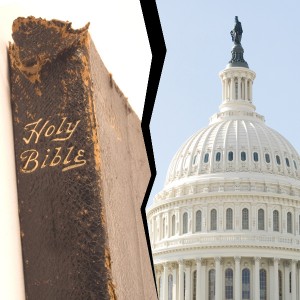Now You See Me, Now You Don’t: The Blaine Amendment

This November, Oklahomans head to the voting booths to elect a president—and also to vote whether their tax money may be used to fund religious institutions.
State Question 790, “Oklahoma Public Money for Religious Purposes,” proposes to remove the Blaine Amendment, a stipulation in the state constitution “which prohibits the government from using public money or property for the direct or indirect benefit of any religion or religious institution.” This proposal arose as a response to controversy surrounding a Ten Commandments statue, after its placement at the Capitol was deemed a violation of the state constitution.
If passed, the overturning of the Blaine Amendment would lead Oklahomans into dangerous and contentious territory with many questions needing answers. Would the legality of using public money or property for religious institutions favor Christians? The Satanic Temple prepared a monument to be placed on public grounds as a response to the construction of the Ten Commandments statue. Would Oklahomans, and specifically the evangelical Attorney General Scott Pruitt, be willing to accept the Satanic monument in the public sphere? What about a statue displaying the tenants of sharia law? The Blaine Amendment, which describes laws included in many state constitutions, prevents these complex questions from becoming larger issues. Without the Blaine Amendment in place, however, Oklahoma and other states that abide by this legislation are opening themselves up to these and more thorny problems.
There are two other upcoming cases regarding the Blaine Amendment. One is being brought by the newly founded “America Without Faith Initiative,” a misnomer because the organization is described as a “project launched by the largest conservative caucus in Congress …[which] aims to reinforce the importance of religious institutions’ role in civil society.”
The second, and more notable of the two cases, involves Florida and the use of education vouchers. If repealed, the Blaine Amendment would no longer prevent public money from being used to fund religious educational institutions. In states like Kentucky where the Blaine Amendment is more malleable, it prevents public money from being used to directly fund religious schools. However it is legal, and even common for funds to be used indirectly in the form of voucher programs that allow public funds to be funneled into religious institutions indirectly.
Simply put, vouchers are funded by the taxpayers and are intended to assist children who otherwise could not afford it to go to private schools. This money is used at the parents’ discretion, and if they choose to send their children to religious schools, then public money has inadvertently ended up in the hands of religious institutions. There are many arguments against voucher programs. Many public schools still suffer from “historic” cuts, since vouchers take money away from public schools, a deplorable reality when many public schools are already lagging. For example, Oklahoman public schools rank thirtieth in the nation, according to US News.
Additionally, private schools are not held to the same standards as public schools are, and they are certainly not required to follow the same curriculum public schools must follow. Many of these private schools are permitted to teach creationism and vouches ensure that public money can be used to fund the teaching of creationism, which is essentially religious in nature and not sound science.
While the Blaine Amendment does some good in upholding the separation of church and state, it is not perfect. Because of its failure to pass the Senate in 1875, it was left up to states to determine whether they wanted to pass their own versions. Today, only thirty-eight of the fifty states have this legislation in their constitutions, leaving twelve states open to using public funds for religious educational institutions. For those states that have enacted their own versions of the Blaine Amendment, too many workarounds for it exist, even though they violate the Establishment Clause. If the Blaine Amendment is repealed, it must pave way for a singular, federal law that explicitly prohibits any public funding from being used on religious schools. If these schools take offense and disagree, the solution is quite simple: teach to the standards set by Common Core, including the Next Generation Science Standards, and not creationism and pseudoscience. If these schools wish to teach unproven theories, then they need to be prevented from receiving any taxpayer funds.
Christian privilege once again runs rampant, and it remains to be seen if these new state legislations would allow for Muslim madrassas, Jewish yeshivas, or Satanic Temple educational facilities to be funded by taxpayer money. Somehow I doubt that Mississippians or Oklahomans would be accepting of their tax dollars going to a Muslim madrassa.
